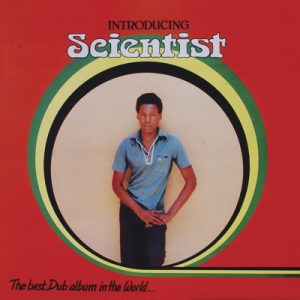 The perfect blending of rhythms, effects, and an oddly bucolic ambiance characterize Scientist's 1980 debut, an effortless masterwork of dub which very nearly earns its self-aggrandizing title in addition to exemplifying why Hopeton Brown was bestowed such an accurate moniker. Nearly all bass and drums plus studio wizardry and scarce half-choruses of organ or guitar, Scientist intimates the future of electronic music to an unsuspecting public in two minute servings, with groundbreaking restraint.
The perfect blending of rhythms, effects, and an oddly bucolic ambiance characterize Scientist's 1980 debut, an effortless masterwork of dub which very nearly earns its self-aggrandizing title in addition to exemplifying why Hopeton Brown was bestowed such an accurate moniker. Nearly all bass and drums plus studio wizardry and scarce half-choruses of organ or guitar, Scientist intimates the future of electronic music to an unsuspecting public in two minute servings, with groundbreaking restraint.
There's an ethereal peace and placidity to the best works of dub, and I feel it here along with the best of Lee Perry or King Tubby (of which Brown was a student). The murmuring, insistent bass, given the perfect center stage, imbues songs like "Elasticated Dub" and "Bali Hi Dub" with an anesthetic sweetness. And trust me, these songs deserve good speakers. The mids and highs rattle along in focused bursts, diverting occasionally into watery delays and subtractive frequency filters while the bass coos on unhindered; patiently, calmly, almost maternally. On my subwoofer, these notes rung out with a persistence that seemed like a heartbeat, interrupted only by well placed snare fills and the ringing electronic hoots of something synthesized I can't seem to identify.
Everything is boxed in, succinct, and only necessary sounds are permitted; trimmed from its vibrant and sometimes overblown reggae source material to a foot-tapping core sound, songs like "Front Line Dub" speak plainly with no distractions, only a pure hook. When a particular guitar melody or organ stab is worth inspecting, Brown pulls everything but the constant bass to a halt and lets the sample play itself out. Hopeton takes these traditional instrumentals and tampers with them so perfectly they play out like live takes from the subconscious of the listener, where the pulsating rhythms like "Jungle Dub" seem to have always existed.
Records like this are why I have always cherished dub over reggae, and why (in my opinion) it has gone relatively farther in musical circles outside its core sound in comparison; dub has always been, to me, a very exact experiment in uncovering shared experiences. Stripped to its simplest means, each instrument and each precise note examined, dub removes the ego and most of the political detritus of reggae and supplants it with forward thinking ideas: putting the producer at the forefront, integrating the studio as an extension of the music, and driving at a smart minimalism which invites a thousand new perspectives on how to craft a record. The best records in dub never squander their precious seconds or lose sight of their ambitions, and for that reason, it's fair to say that The Best Dub Album In The World is almost certainly a contender for such a title.
samples:
 
Read More

